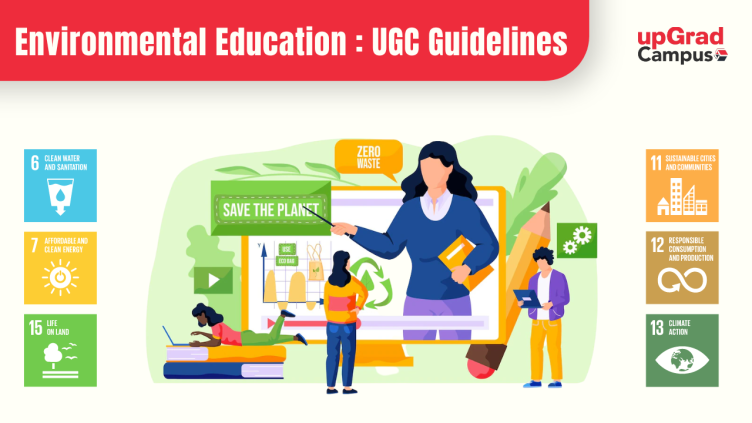UGC Releases Guidelines for Environmental Education
On February 13, 2023
[Dear readers, if you are part of a Higher Education Institution and looking to transform your College/University, you can reach out to us at campus.sales@upgrad.com or drop us a “Hi” on WhatsApp.]
The University Grants Commission (UGC) has taken a significant step towards promoting environmental awareness and conservation by releasing Draft Guidelines and Curriculum Framework for Environment Education at the Undergraduate level.
This move is in line with the National Education Policy (NEP) 2020, which highlights the importance of environmental education and its integration into curricula. [You can watch our detailed episode on NEP here]. The new framework is expected to cater to students from various disciplinary backgrounds and sensitize them towards the nation's commitment towards sustainable development.
UGC Promotes Environmental Education
The University Grants Commission (UGC) has been promoting environmental education in India for many years. In 2003, it released a core module syllabus for the compulsory implementation of Environmental Studies at the undergraduate level. This was a major step forward in incorporating environmental education into the mainstream education system in India.
Later, in 2017, the UGC framed an 8-unit module syllabus for the Ability Enhancement Compulsory Course (AECC-Environmental Studies) under the Choice-Based Credit System (CBCS). This syllabus was designed to give students a comprehensive understanding of environmental issues and their impact on the planet.
Updated Framework and Guidelines by UGC
Environmental education is crucial today as it helps individuals understand their role and responsibility towards the environment and its conservation. Out of the 17 Sustainable Development Goals (SDGs), six goals are directly linked to environmental protection and resource conservation.
By implementing environmental education, the UGC can play a key role in raising awareness about environmental issues and promoting sustainable behaviour among students and faculty members. This can help create a culture of environmental responsibility, which can positively impact both the university and the wider community.

The new curriculum framework consists of 9 units with a total of 30 hours of teaching. The total credits for the course allotted are 4, and the major topics covered in the framework are:
- Humans and the Environment
- Natural Resources and Sustainable Development
- Environmental Issues: Local, Regional and Global
- Conservation of Biodiversity and Ecosystems
- Environmental Pollution and Health
- Climate Change: Impacts, Adaptation, and Mitigation
- Environmental Management
- Environmental Treaties and Legislation
- Case studies and Fieldwork
The framework aims to encourage students to participate in community engagement and service projects related to environmental education and conservation through fieldwork and industrial visits.
The release of the draft guidelines and curriculum framework by UGC for environment education at the undergraduate level is a significant step towards promoting environmental awareness and conservation in our country. The framework is expected to provide students with a comprehensive understanding of ecological issues and sensitize them towards the nation's commitment towards sustainable development. UGC's efforts will go a long way in promoting it among students, faculty and a wider community.


